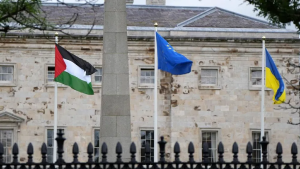
Photo: A Palestinian flag was raised outside the Irish Parliament to mark its recognition of Palestinian statehood. BBC News
On Tuesday 28th May, Spain, Ireland and Norway officially recognised Palestinian statehood. This move adds to the Israel’s increasing isolation since its genocidal war on Gaza started almost eight months ago.
Statements by each of these European countries explained that they wanted to accelerate efforts to secure a permanent ceasefire in Gaza and that they aimed to encourage other European Union countries to follow suit.
In a televised address, Spanish Prime Minister Pedro Sanchez said: “It’s the only way of advancing toward what everyone recognises as the only possible solution to achieve a peaceful future, one of a Palestinian state that lives side by side with the Israeli state in peace and security.” Prime Minister Sanchez added that Spain would not recognise any changes to pre-1967 borders unless agreed to by both parties.
Ireland’s Prime Minister Simon Harris stated: “We had wanted to recognise Palestine at the end of a peace process. However we have made this move alongside Spain and Norway to keep the miracle of peace alive.”
As well, Ireland is committed to upgrading its office in Ramallah in the West Bank to an embassy. An ambassador is to be appointed to this embassy. Ireland also confirmed that it would upgrade the status of the Palestinian mission in Ireland to an embassy.
Norway, which chairs the International Donor Group for Palestine (AHLC), had until recently followed the US position but has lost confidence in the effectiveness of this strategy.1
This latest move by Spain, Ireland and Norway means that 146 of the 193 member states of the United Nations now recognise a Palestinian state.
Of the 27 members of the European Union – Sweden, Cyprus, Hungary, the Czech Republic, Poland, Slovakia, Romania and Bulgaria – have already recognised a Palestinian state. Slovenia is expected to recognise Palestinian statehood in the coming week while Malta has said it was planning to do the same.
In contrast, Australia – along with a number of former colonial powers such as the United States, United Kingdom, France, Germany, Japan, Italy and New Zealand – continues to withhold recognition.
The Albanese government is still relying upon the old view that the peace process in the Middle East needs to conclude before Palestinian statehood is recognised.
This view is no longer regarded as legitimate by the majority of UN members. As the Norwegian Foreign Minister stated: “We used to think that recognition would come at the end of a process … Now we have realised that recognition should come as an impetus, as a strengthening of a process.”
Much criticism has rightfully been levelled against the Albanese government for its failure to impose sanctions against Israel for committing war crimes in the occupied Gaza Strip. Failure to censure the Netanyahu government’s implacable opposition to negotiating a two-state solution with the Palestinians, along with state repression and settler violence in the occupied West Bank, has also drawn criticism.
Australia should be a vocal advocate of developing a lasting peace in Israel and Palestine. To advance this cause, it needs to immediately follow the example of Spain, Ireland and Norway and officially recognise a Palestinian state.
Petition
A petition entitled ‘Australia to declare recognition of the State of Palestine’ is still open. It closes on 12th June 2024 at 11:59 PM (AEST).
Notes
1. The AHLC consists of 30 countries and organisations and was established with a view to creating an institutional and economic basis for a Palestinian state within the framework of a negotiated two-state solution.